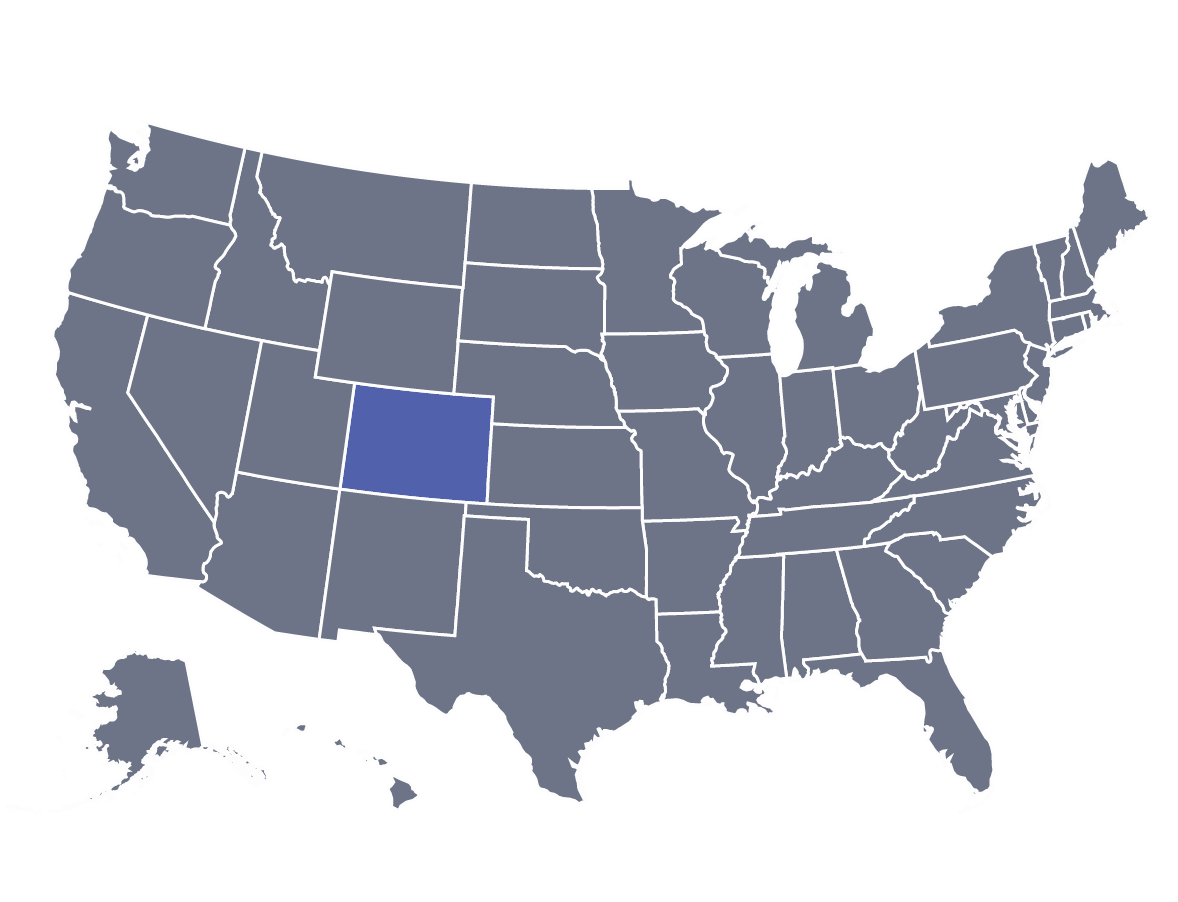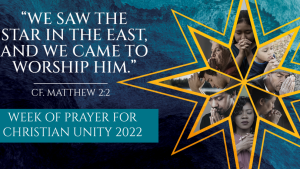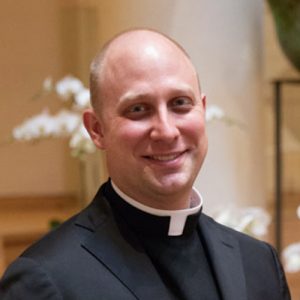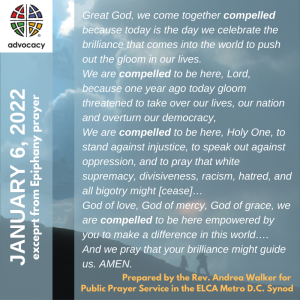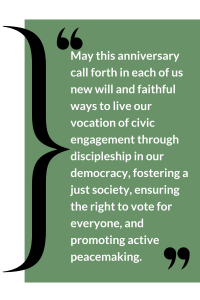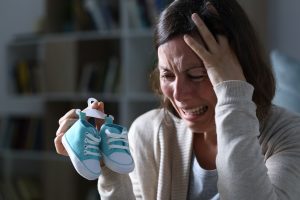(original from ELCA Advocacy view here)
Across the United States and over the years, places of worship and people of faith have been key partners in welcoming refugees, asylum seekers and others in need of hospitality. ELCA members and congregations have recently poured in their concern, prayers, and offers of assistance for uprooted Afghan neighbors following the end of the U.S.’ long war in Afghanistan. As ELCA and through Lutheran Immigration and Refugee Service (LIRS), we can continue to offer our support in the months and years ahead. The very heart of Christian faith leads us to welcome the newcomer among us.
The following is an overview of what’s happened, how Lutheran communities are stepping up to support, and where you can engage further by advocating for legal protections for new arrivals.
WEBINAR VIDEO: “Walking Beside Our Afghan Neighbors”
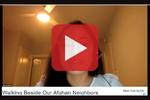 *NEW* The webinar, “Walking Beside Our Afghan Neighbors,” provided great insights from key Lutheran leaders, including a congregation leader involved in resettlement, a Lutheran social service organization, ELCA advocacy staff and LIRS policy leadership. View the archive of the one-hour session, originally presented Nov. 18, 2021. View from the ELCA Vimeo page at https://vimeo.com/648669699 (program begins at 1 minute 20 seconds).
*NEW* The webinar, “Walking Beside Our Afghan Neighbors,” provided great insights from key Lutheran leaders, including a congregation leader involved in resettlement, a Lutheran social service organization, ELCA advocacy staff and LIRS policy leadership. View the archive of the one-hour session, originally presented Nov. 18, 2021. View from the ELCA Vimeo page at https://vimeo.com/648669699 (program begins at 1 minute 20 seconds).
SITUATION UPDATE
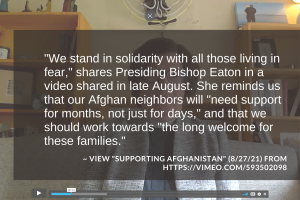 According to recent government figures, the United States is on pace to resettle around 75,000+ Afghans in the coming weeks. The U.S. government has evacuated tens of thousands of men, women and children from Afghanistan in recent months and plans to continue evacuation and resettlement operations through 2022.1
According to recent government figures, the United States is on pace to resettle around 75,000+ Afghans in the coming weeks. The U.S. government has evacuated tens of thousands of men, women and children from Afghanistan in recent months and plans to continue evacuation and resettlement operations through 2022.1
Humanitarian Concerns
In Afghanistan, the situation continues to deteriorate, especially for many women and girls. Advancements in women’s rights, education, employment, and political opportunities appear at risk under the Taliban government.2 Additionally, Afghanistan is contending with a worsening humanitarian crisis. Most recent aid has gone towards staving off food insecurity and the collapse of the public health system and economy.3 Oftentimes, it is women and children who suffer the most during periods of prolonged conflict.
The international community and faith communities have continued to urge protection of civilians, including women and girls, academics, journalists, human rights defenders, and members of ethnic, religious, and other minority group from harm. The U.S. government has resumed the priority evacuation of some former U.S.-affiliated Afghans—mostly visa applicants left behind in the hasty operation, while tragically excluding others still at risk.
Humanitarian Parole
During the evacuation operations, many Afghans were admitted to the United States under temporary humanitarian parole status. Humanitarian parole, unlike U.S. refugee status or Special Immigrant Visa (SIV) status, expires after two-years, offers limited access to benefits, and has no direct path to lawful permanent residency (i.e. a “green card”). Afghans with this status face an uncertain future once they arrive.
Fortunately, as a part of the stop-gap funding bill recently passed by Congress and signed by the president on Sept. 30, lawmakers authorized Afghans admitted with parole to receive the same benefits as refugees, an ID and/or driver’s license.
Resettlement Processing
After being processed and rigorously screened on military bases, Afghan individuals and families are referred to resettlement agencies before continuing to their next destination. The multi-agency, Operation Allies Welcome has been coordinating their arrival, assistance, and resettlement with the help of resettlement agencies like LIRS through its affiliates.
The government has also launched the private Sponsor Circle Program, created to enable groups to sponsor and assist Afghans directly in acknowledge of unmet need. This program operates parallel to the existing framework of private resettlement agencies long supported by the American public and faith-based organizations.
LUTHERAN DISASTER RESPONSE ACTIVITY
Lutheran Disaster Response (LDR) has reached out to synods, congregations and affiliates taking an active role in welcoming Afghan families. Support for volunteers and interpreters is critical, as are housing assistance, health and wellness care, and fostering community belonging. LDR works in partnership with LIRS and Church World Service (CWS), the lead organizations in resettling Afghan families.
DIRECT INVOLVEMENT OPPORTUNITIES
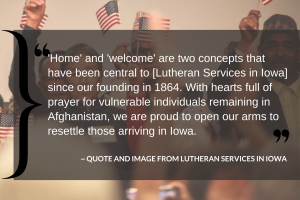 Local connections, for example your area Lutheran Social Service (LSS) location, are a great first place to find out what needs you can help meet in your immediate community.
Local connections, for example your area Lutheran Social Service (LSS) location, are a great first place to find out what needs you can help meet in your immediate community.
- The Refugee Council USA has posted a map that pinpoints local resettlement agencies, including LSS affiliates, which may direct you to volunteer opportunities.
- A more detailed state-by-state is available in the Reception & Placement Affiliate Directory (May 2021) and can help direct you to local opportunities.
LIRS continues to advocate for evacuation of Afghans and their families to give them a place of safety on U.S. soil. “Since we launched our Afghanistan-focused volunteer portal, LIRS and our partners have received more than 45,000 volunteer applications.” Applications to volunteer with LIRS are still open. Their team is hard at work connecting groups and individuals with opportunities to “help with airport pick-ups, apartment set-ups, English lessons, and other critical services,” states the LIRS “How to Help Afghan Refugees” page.
Church World Service (CWS) has a new opportunity for remote placement of Afghan refugees for congregations that are more than 100 miles from a local resettlement office.
- Discover more about Afghan Placement and Assistance (APA) Program community partners from CWS.
A Resettlement Story shared by Lutheran Services Iowa (LSI) staff member
“’Home’ and ‘welcome’ are two concepts that have been central to Lutheran Services Iowa since our founding in 1864. With hearts full of prayer for vulnerable individuals remaining in Afghanistan, we are proud to open our arms to resettle those arriving in Iowa. As a resettlement partner of Lutheran Immigration and Refugee Service, LSI is prepared to resettle 525 Afghans and other refugees in Des Moines, Sioux City, and other areas of the state in the coming months. To support current resettlement needs, LSI is actively recruiting Pashto and Dari interpreters, training volunteers, soliciting financial and in-kind donations, and hiring additional staff. LSI is working with property owners, employers, community partners, and faith leaders to meet individuals’ needs not only when they arrive at the airport, but in the months and years after. LSI has a broad array of post-resettlement services, such as financial literacy, small business development, family wellness, English classes, and more designed to ensure newcomers to our community thrive. [We’re responding] to the love of Jesus Christ through compassionate service.”
ADVOCACY
The “Safety for Our At-Risk Neighbors in Afghanistan” Action Alert from the ELCA Advocacy Action Center received a lot of support from Lutherans and friends who joined the ELCA in urging a strong federal response to support Afghan neighbors still at risk. The customizable way to reach out to your member of congress is still active.
- Use the Action Alert to express your priorities as we “urge the administration and Congress to commit to providing refuge for those at-risk and expand and expedite their access to the United States resettlement program.”
Afghan Adjustment Act Needed
Again, we are called to be leaders in society in both offering hospitality and advocating for the newcomer. Congress has a real opportunity to come together, to acknowledge the humanity of our Afghan neighbors, and to realize the hope of a future free from harm. The Administration and Congress must be able to simultaneously ensure a future for Afghans in Afghanistan, prioritize pathways to safety, pass legal protections for newcomers, and address barriers holding families apart.
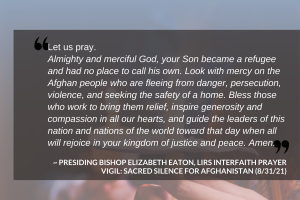 An uncertain legal limbo awaits Afghans who fled their war-torn country unless Congress takes urgent action to introduce and pass an Afghan Adjustment Act. An Afghan Adjustment Act would allow humanitarian parole recipients, here in the United States, to adjust their status, providing long-term stability and security for themselves and families. Congress has authorized similar legal pathways for Cuban and South Asian refugees. The ELCA is actively monitoring developments and advocating for a quick response to the plight of our Afghan neighbors caught in this precarious situation.
An uncertain legal limbo awaits Afghans who fled their war-torn country unless Congress takes urgent action to introduce and pass an Afghan Adjustment Act. An Afghan Adjustment Act would allow humanitarian parole recipients, here in the United States, to adjust their status, providing long-term stability and security for themselves and families. Congress has authorized similar legal pathways for Cuban and South Asian refugees. The ELCA is actively monitoring developments and advocating for a quick response to the plight of our Afghan neighbors caught in this precarious situation.
POISED FOR WELCOME
People of faith in the ELCA are uniquely poised to advocate for a welcome that lives up to the biblical call to love our neighbor, as a church that “holds power accountable, advocates justice, stands with those who are poor and vulnerable, provides sanctuary, and meets human needs” (from the ELCA social statement For Peace in God’s World). In the decade after the fall of Saigon in 1975, Lutheran congregations sponsored over 50,000 refugees from Vietnam, Cambodia and Laos.4 We are here, as Presiding Bishop Elizabeth Eaton articulated in her “Supporting Afghanistan” video, for the long welcome.
Again, we hear God’s call to accompany one another while speaking up for a generous policy of welcome. We will walk with our Afghan neighbors as they arrive, as they are resettled, and as they continue to become part of our communities. And we will advocate with and for our neighbors in this moment of need.
ENDNOTES
1 The administration is seeking $6.4 billion for the ongoing effort to resettle Afghans who were evacuated during the U.S. withdrawal from Afghanistan.
2 More in “What Will Peace Talks Bode for Afghan Women?” (International Crisis Group, 4/6/20)
3 Additional information is available in “Donors pledge $1bn in aid for Afghanistan as UN warns of crisis” (Al Jazeera article, 9/13/21)
4 Find this statistic and more in the ELCA social message “Immigration.”


